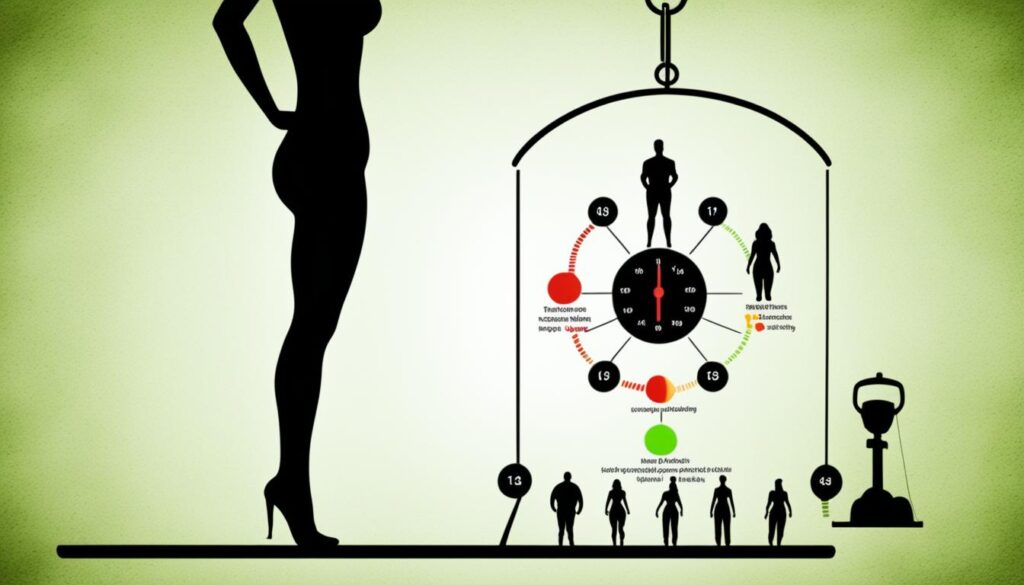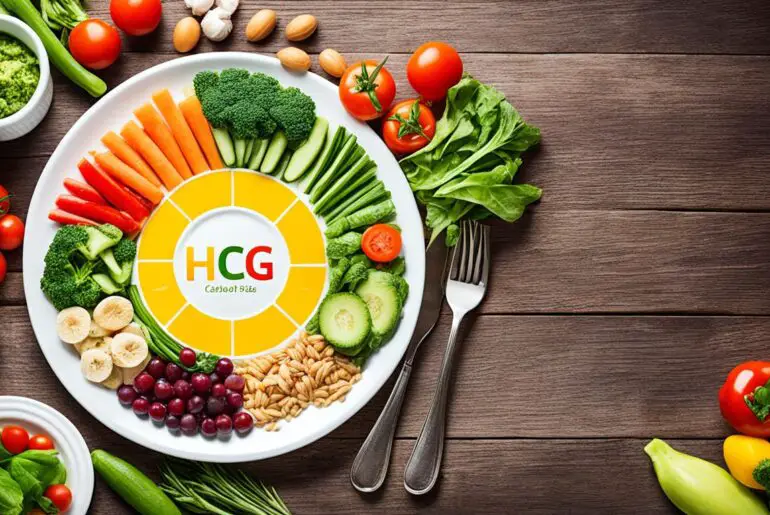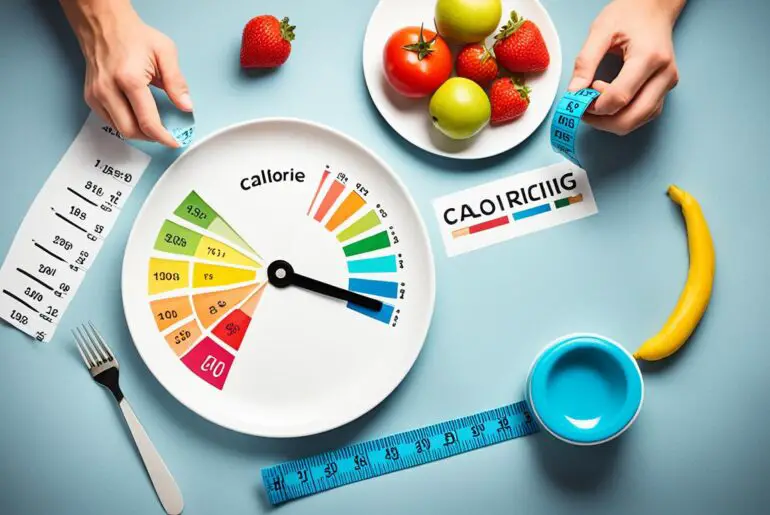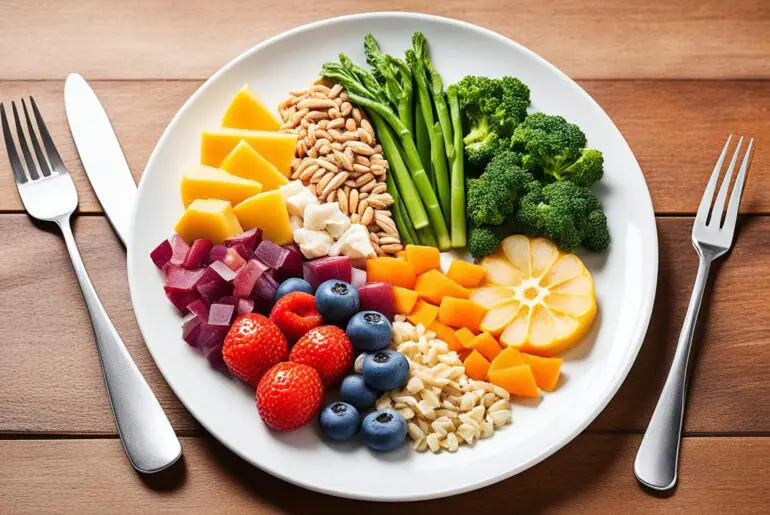Are you struggling to maintain your weight after completing the HCG diet? Surprisingly, it’s not just about the number of calories you consume but also how you adjust your calorie intake during different phases of the diet.
Many people experience weight gain after the HCG diet because their bodies go into starvation mode and hold onto calories. But fear not! By making careful adjustments to your calorie intake, you can maintain your weight and avoid the dreaded post-diet weight gain.
In this article, I will guide you through the importance of adjusting calories during HCG diet phases, how to gradually increase your calorie intake, reintroduce certain foods into your diet, establish an exercise routine, and seek medical supervision. Are you ready to discover the secrets to successful weight maintenance after the HCG diet?
Key Takeaways:
- Adjusting calorie intake is crucial for weight maintenance after the HCG diet.
- Gradually increasing calorie intake helps prevent the body from going into starvation mode and holding onto calories.
- Reintroducing sugars and starchy foods with moderation is essential for a balanced diet.
- Formulating an exercise routine is important to maintain weight loss and overall health.
- Seeking medical supervision ensures safety and maximizes the effectiveness of the HCG diet.
The Problem with HCG Dieters
When individuals accustomed to consuming high-calorie diets embark on the HCG diet, their bodies may perceive it as a state of starvation. As a result, when they reintroduce calories after completing the diet, they may experience weight gain. The struggle to maintain weight after the HCG diet is a common problem faced by many individuals. Regaining lost weight can be disheartening and frustrating. However, by acknowledging this issue and making necessary adjustments, it is possible to prevent weight regain and effectively manage weight after the HCG diet.
One of the crucial aspects to address when overcoming weight regain is understanding the impact of calorie restriction on the body’s metabolism. The HCG diet severely limits calorie intake, which signals the body to conserve energy and hold onto calories. When calories are reintroduced, the body may still be in the mindset of storing calories rather than utilizing them for energy. This can lead to weight gain and hinder weight maintenance efforts post-diet.
To prevent weight regain after the HCG diet, it is essential to implement appropriate strategies that focus on long-term weight management. Gradually increasing calorie intake, reintroducing sugars and starchy foods in moderation, and formulating a suitable exercise routine are key elements for successful weight maintenance.
“It is crucial to understand the physiological responses to the HCG diet and address the challenges faced by HCG dieters to ensure sustainable weight management.” – Dr. Smith, HCG Diet Specialist
Gradual Increase of Calorie Intake
After completing the HCG diet, it’s important to transition back to a regular diet without causing weight gain. One strategy to achieve this is by gradually increasing calorie intake over time. This gradual approach helps prevent the body from going into starvation mode and holding onto calories, which can lead to unwanted weight gain. By slowly increasing calorie intake, you give your body the opportunity to adjust and maintain a healthy weight.
To implement a gradual calorie increase, start by adding an extra 200 kcal per day to your diet for the first week. This small but calculated increase allows your body to adapt to the change without overwhelming it. As the weeks progress, continue to gradually increase your calorie intake until you reach the optimal calorie levels for weight maintenance.
To determine the optimal calorie levels for your body, you can use a simple calculation: multiply your weight by 13. This will give you an estimate of the daily calorie intake that suits your weight maintenance needs. Aim to reach around 1500 kcal per day, but remember that individual needs may vary.
By following a gradual increase of calorie intake, you can ensure that your body adjusts without triggering weight gain. It’s important to monitor your progress and make adjustments as needed. Remember, everyone’s body is different, so finding the optimal calorie levels for you may require some experimentation and customization.
Gradually increasing calorie intake after the HCG diet is a key strategy for successful weight maintenance. It allows your body to reset its metabolism and minimize the risk of weight regain. Along with mindful calorie adjustments, it’s important to make healthy food choices, engage in regular physical activity, and seek medical supervision to support your weight maintenance journey.
Bring Back Your Normal Diet Routine

After completing the HCG diet, it’s time to reintroduce sugars and starchy foods back into your regular eating routine. However, it’s important to do so gradually and with moderation. By following these guidelines, you can ensure a smooth transition and maintain your weight loss success.
Reintroducing Sugars and Starchy Foods
When reintroducing sugars and starchy foods, start with low-carb and low-fat options. Incorporate whole grains, such as brown rice and quinoa, into your meals. Add fruits and natural sweeteners, like honey and maple syrup, to satisfy your sweet tooth. Remember to enjoy these foods in moderation, as excessive consumption can lead to weight gain.
Here is a list of sugary and starchy foods to consider:
| Sugars | Starchy Foods |
|---|---|
| Fruits | Whole Grains |
| Honey | Lentils |
| Maple Syrup | Potatoes |
| Dark Chocolate | Beans |
| Date Sugar | Oats |
Remember to monitor your weight during this period and make adjustments if necessary. Keeping track of your progress will help you maintain control and make informed decisions about your diet.
Resetting Your Metabolism
After the HCG diet, it’s essential to give your body time to readjust and reset its metabolism. This process can take up to nine weeks. By gradually reintroducing sugars and starchy foods, you’re allowing your body to adapt and find its new balance.
Summary
Reintroducing sugars and starchy foods into your diet after completing the HCG diet requires patience and moderation. By following these guidelines and monitoring your weight, you can successfully maintain your weight loss and continue on your journey to a healthier lifestyle.
Formulate an Exercise Routine
During the HCG diet, strenuous exercise is not recommended due to the reduced calorie intake. However, after completing the diet and gradually increasing calorie intake, it is important to incorporate regular exercise into your routine. Exercise plays a crucial role in maintaining weight and promoting overall health. Aim for at least 75 minutes of vigorous exercise or 150 minutes of moderate exercise per week to maintain your weight and maximize the benefits of the HCG diet.
When it comes to exercise after the HCG diet, there are different options to choose from based on your preferences and lifestyle. Here are a few exercise ideas to consider:
Cardio:
Engaging in cardio exercises is an effective way to burn calories and improve cardiovascular health. You can try activities such as running, cycling, swimming, or jumping rope. These exercises not only help you maintain your weight, but they also boost your endurance and stamina.
Resistance Training:
Incorporating resistance training into your exercise routine will help you build lean muscle mass. This can increase your metabolism and aid in weight maintenance. You can use free weights, resistance bands, or even your own body weight for exercises like squats, lunges, push-ups, and planks.
Brisk Walking:
Walking is a low-impact exercise that can be easily incorporated into your daily routine. Aim for brisk walks of at least 30 minutes or more to elevate your heart rate and burn calories. Take advantage of nature trails, parks, or even walking on a treadmill indoors.
Biking:
Cycling is another great option for exercise after the HCG diet. Whether you choose a stationary bike or prefer outdoor cycling, it provides a low-impact workout that can be enjoyed by people of all fitness levels. Consider joining a cycling group or exploring new scenic routes in your area.
Zumba:
If you enjoy dancing and want to add a fun element to your exercise routine, Zumba is a great choice. Zumba combines dance movements with cardio exercises, making it an enjoyable way to burn calories and improve your overall fitness. Look for local Zumba classes or follow online video tutorials.
Remember to consult with your healthcare provider before starting any new exercise program, especially if you have underlying health conditions or injuries. They can provide personalized recommendations based on your specific needs.
By formulating an exercise routine that includes a variety of activities you enjoy, you can make exercise an enjoyable part of your post-HCG diet lifestyle. Regular exercise, in combination with a healthy diet, will not only help you maintain your weight but also improve your overall well-being.
Importance of Medical Supervision

When embarking on the HCG diet, it is crucial to prioritize your safety and well-being by seeking medical supervision and choosing an authorized clinic. Medical supervision ensures that you have professional guidance throughout your weight loss journey and minimizes the risk of potential side effects. To find a clinic near you that offers the HCG diet program, simply search for “HCG diet near me” and explore the authorized clinics in your area.
Rani MD is proud to offer a medically supervised HCG program to assist individuals in achieving their weight loss goals. Our team of experienced professionals will provide comprehensive support, monitoring your progress and addressing any concerns or questions you may have along the way. With our expertise and guidance, you can confidently embark on your HCG diet journey, knowing that you have the necessary medical supervision to ensure your safety and success.
The Benefits of Medical Supervision
Opting for a medically supervised HCG program offers several advantages. First and foremost, it provides you with personalized care tailored to your specific needs and goals. A qualified healthcare professional will assess your medical history, conduct necessary tests, and closely monitor your progress to ensure that the HCG diet is safe and effective for you.
Moreover, medical supervision increases the likelihood of successful weight loss and weight maintenance. By having regular check-ins with a healthcare provider, you can receive guidance on adjusting your calorie intake, addressing plateaus, and making any necessary modifications or additions to your diet and exercise routine.
“Medical supervision ensures that you have professional guidance throughout your weight loss journey and minimizes the risk of potential side effects.”
Additionally, medical professionals can provide you with valuable educational resources and advice on practicing healthy habits beyond the HCG diet. They can teach you sustainable lifestyle changes, such as proper nutrition, portion control, and exercise, that will contribute to long-term weight management and overall well-being.
Therefore, entrusting your HCG diet journey to a medically supervised program not only ensures your safety and success but also equips you with the knowledge and tools to achieve lasting results.
Authorized Clinics for Your Peace of Mind
Choosing an authorized clinic for your HCG diet program is of utmost importance. Authorized clinics follow strict guidelines and protocols established by experts in the field, ensuring that your treatment adheres to the highest professional standards.
When selecting an authorized clinic, consider factors such as the clinic’s reputation, testimonials from previous patients, and the qualifications and expertise of the medical professionals involved. By prioritizing authorized clinics, you can have peace of mind knowing that you are receiving care from trusted and qualified professionals who are committed to your well-being.
Summary
In summary, the importance of medical supervision cannot be overstated when it comes to the HCG diet. Seeking medical supervision through an authorized clinic ensures your safety, minimizes potential side effects, and increases your chances of successful weight loss and maintenance. With a medically supervised HCG program, such as the one offered by Rani MD, you can embark on your weight loss journey with confidence, knowing that you have the support and guidance of qualified healthcare professionals who prioritize your well-being. Take the first step towards achieving your weight loss goals and search for “HCG diet near me” to discover authorized clinics in your area.
Increasing Calories on the HCG Diet
While the original HCG diet plan is very strict with a 500-calorie intake, some people have experimented with increasing calorie intake on the diet. It is possible to increase calories to 800 or even up to 1100 while still losing weight on the HCG diet. It is essential to follow the other rules of the diet and be consistent with calorie intake to achieve success. Increased calorie intake may result in slower weight loss compared to the original plan.
Feasibility of Increasing Calories on the HCG Diet
“I found that gradually increasing my calorie intake while on the HCG diet helped me maintain my weight loss without feeling deprived. By increasing my calories to 800, I found that my energy levels improved and I was able to stick to the diet more easily.”
While the original HCG diet plan is designed to be very low in calories, some individuals may find it challenging to sustain such a low intake. Experimenting with higher calorie plans, such as those in the range of 800-1100 calories, provides an alternative approach that still allows for weight loss. By increasing calorie intake, individuals can provide their bodies with more fuel while still benefiting from the effects of the HCG hormone.
| Calorie Intake (per day) | Pros | Cons |
|---|---|---|
| 500 | Maximum weight loss potential | May feel excessively hungry or fatigued |
| 800-1100 | Improved energy levels | Slower weight loss compared to 500 calories |
Increasing calorie intake on the HCG diet may require careful consideration and monitoring. It is crucial to ensure that the additional calories come from healthy sources and do not overstep the limits of the diet. Consulting with a healthcare professional or registered dietitian can provide valuable guidance on adjusting calorie intake while remaining on the HCG diet.
Overcoming Challenges in the First Week of the HCG Diet

The first week of the low-calorie phase of the HCG diet can present several challenges, but with the right mindset and preparation, they can be overcome. Understanding the body’s adaptation process, addressing psychological hunger, managing water intake, and considering detoxing/cleansing can all contribute to a successful start in Phase 2.
Body Adaptation: Patience is Key
During the initial week of the HCG diet, it’s important to recognize that the body is adapting to the reduced calorie intake. As a result, you may experience symptoms such as headaches and low energy levels. Remember that these are temporary and part of the body’s adjustment process. Stay committed, focused, and remind yourself of the numerous benefits this diet can offer.
Psychological Hunger: Mind Over Matter
Psychological hunger can be a significant challenge during the first week of the HCG diet. Even though your body is taking in fewer calories, you may still experience cravings or a desire to eat out of habit. Overcoming this challenge requires a strong mental mindset. Use strategies such as distraction, mindful eating, and finding healthy alternatives to satisfy cravings. Remember, you have the power to choose what you put in your body.
Optimal Water Intake: Hydration Matters
Water plays a crucial role in any diet, and the HCG diet is no exception. Staying adequately hydrated is essential for optimal fat release and toxin elimination. Aim to drink at least 8 cups (64 ounces) of water per day to support your weight loss journey. Consider setting reminders or carrying a water bottle with you to ensure you stay hydrated throughout the day.
Detoxing/Cleansing: Promoting a Healthy Start
The HCG diet provides an opportunity for detoxing and cleansing the body. By focusing on clean and simple foods, you support the elimination of toxins and promote overall well-being. Green vegetables are a great addition to the HCG diet as they are unlimited and provide essential nutrients. Incorporate them into your meals for added satiety and detoxification benefits.
Remember, breakfast options are available during the HCG diet. Don’t skip this important meal as it can help kickstart your metabolism for the day. Additionally, keep in mind that your body will adapt to the HCG diet over time. As you progress through the program, you may find it easier to navigate the challenges and embrace the positive changes happening within your body.
Conclusion
Adjusting calorie intake is a crucial aspect of maintaining weight after the HCG diet. By gradually increasing calorie intake, individuals can avoid the body going into starvation mode and holding onto calories. Reintroducing sugars and starchy foods in moderation, formulating an exercise routine, and seeking medical supervision are essential strategies for long-term weight maintenance.
Overcoming challenges during the first week and staying motivated are also vital for success. During this time, it’s important to stay prepared, hydrated, and remind yourself of the benefits of the diet. By making these adjustments and staying committed, individuals can optimize weight loss and safely maintain their desired weight.
Remember, the HCG diet is a powerful weight loss tool, but it requires dedication and adherence to its principles. Through proper adjustments in calorie intake, dietary choices, exercise, and medical supervision, individuals can not only lose weight successfully but also maintain their weight in the long run, leading to a healthier and more balanced lifestyle.
FAQ
What should I do to maintain my weight after completing the HCG diet?
To maintain your weight after completing the HCG diet, it’s important to gradually increase calorie intake and make dietary adjustments. This helps prevent weight gain and allows your body to readjust and reset its metabolism.
How should I gradually increase my calorie intake after the HCG diet?
Start by increasing calorie intake by 200 kcal per day for the first week and continue to increase until reaching the optimal calorie level of around 1500 kcal per day. The optimal number of calories can be calculated by multiplying your weight by 13.
Can I reintroduce sugars and starchy foods into my diet after the HCG diet?
Yes, you can reintroduce sugars and starchy foods slowly into your diet after completing the HCG diet. Start with low-carb and low-fat options and keep everything in moderation. Monitor your weight during this period and make adjustments if necessary.
Should I exercise after completing the HCG diet?
Yes, after completing the HCG diet and gradually increasing calorie intake, it is important to incorporate regular exercise into your routine. Aim for at least 75 minutes of vigorous exercise or 150 minutes of moderate exercise per week to maintain your weight.
Is medical supervision necessary for the HCG diet?
Yes, it is recommended to seek medical supervision and choose an authorized clinic to ensure safety and avoid potential side effects. Search for “HCG diet near me” to find a list of clinics that offer medically supervised HCG programs.
Can I increase calorie intake on the HCG diet?
While the original HCG diet plan is very strict with a 500-calorie intake, some people have experimented with increasing calorie intake on the diet. It is possible to increase calories to 800 or even up to 1100 while still losing weight on the HCG diet.
What challenges can I expect during the first week of the HCG diet?
The first week of the low-calorie phase of the HCG diet can be challenging. You may experience headaches, low energy, and the body adjusting to the clean and simple foods of the diet. Drinking enough water, eating green vegetables, and reminding yourself of the benefits of the diet can help overcome these challenges.
What is the importance of adjusting calorie intake during the HCG diet phases?
Adjusting calorie intake during different phases of the HCG diet is vital for weight maintenance. Gradually increasing calories, reintroducing sugars and starchy foods with moderation, formulating an exercise routine, and seeking medical supervision are key strategies for maintaining weight after the HCG diet.
How do I adjust calorie intake during the HCG diet phases?
To adjust calorie intake during the HCG diet phases, gradually increase calorie intake by 200 kcal per day for the first week and continue to increase until reaching the optimal calorie level of around 1500 kcal per day. This helps prevent weight gain and allows for a healthy weight maintenance.




